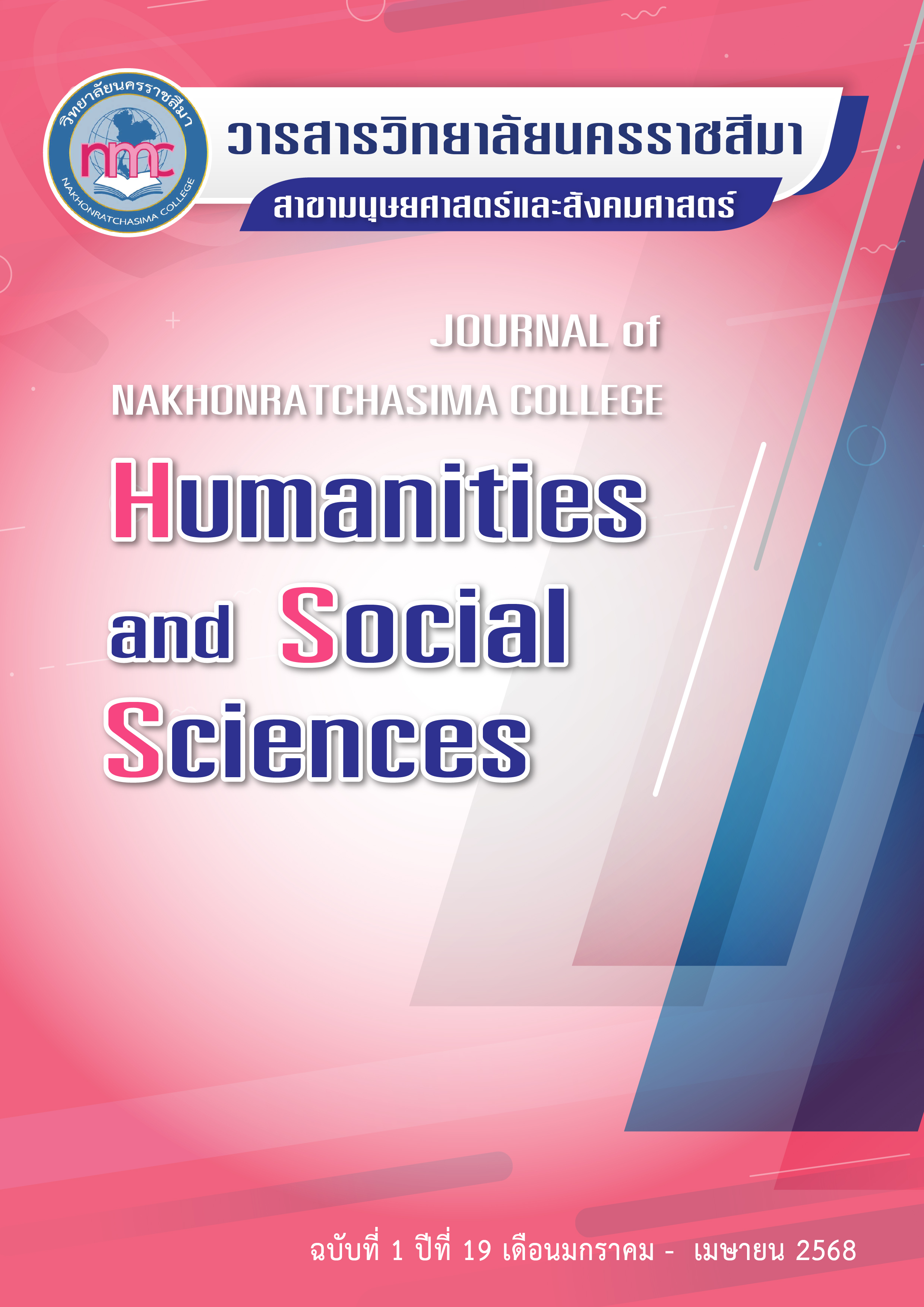กลยุทธ์การจัดการเรียนรู้เพื่อส่งเสริมการเป็นผู้ประกอบการผ่านการบูรณาการภูมิปัญญาท้องถิ่นสำหรับนักเรียนระดับการศึกษาขั้นพื้นฐาน
คำสำคัญ:
กลยุทธ์การจัดการเรียนรู้, การเป็นผู้ประกอบการ , ภูมิปัญญาท้องถิ่นบทคัดย่อ
การวิจัยครั้งนี้มีวัตถุประสงค์ (1) เพื่อวิเคราะห์สภาพปัจจุบัน ปัญหา และความต้องการในการจัดการเรียนรู้เพื่อส่งเสริมการเป็นผู้ประกอบการโดยใช้ภูมิปัญญาท้องถิ่น สำหรับนักเรียนระดับการศึกษาขั้นพื้นฐาน (2) เพื่อพัฒนากลยุทธ์การจัดการเรียนรู้เพื่อส่งเสริมการเป็นผู้ประกอบการผ่านการบูรณาการภูมิปัญญาท้องถิ่น สำหรับนักเรียนระดับการศึกษาขั้นพื้นฐาน (3) เพื่อทดลองใช้และประเมินประสิทธิผลของกลยุทธ์การจัดการเรียนรู้เพื่อส่งเสริมการเป็นผู้ประกอบการผ่านการบูรณาการภูมิปัญญาท้องถิ่น สำหรับนักเรียนระดับการศึกษาขั้นพื้นฐาน ด้วยกระบวนการวิจัยเชิงปฏิบัติการแบบมีส่วนร่วม 3 ระยะ คือ ระยะที่ 1 การวิเคราะห์สภาพปัจจุบัน ปัญหาและความต้องการในการจัดการเรียนรู้ ระยะที่ 2 การพัฒนากลยุทธ์การจัดการเรียนรู้เพื่อส่งเสริมการเป็นผู้ประกอบการ และระยะที่ 3 การทดลองใช้และประเมินประสิทธิผลของกลยุทธ์การจัดการเรียนรู้ กลุ่มผู้ให้ข้อมูลมีจำนวน 6 กลุ่ม คือ ผู้บริหารโรงเรียน ครู ปราชญ์ท้องถิ่น ผู้ประกอบการ และนักเรียน วิเคราะห์ข้อมูลด้วยค่าเฉลี่ย ส่วนเบี่ยงเบนมาตรฐาน การวิเคราะห์เนื้อหาและทดสอบค่าที
ผลการวิจัยพบว่า
- 1. หลักสูตรสถานศึกษาส่วนใหญ่ยังขาดการบูรณาการระหว่างการเป็นผู้ประกอบการกับ
ภูมิปัญญาท้องถิ่น การเรียนรู้ด้านภูมิปัญญามักเน้นการอนุรักษ์มากกว่าต่อยอดเชิงเศรษฐกิจ ขณะที่
ครูส่วนใหญ่ขาดทักษะในการสอนเพื่อส่งเสริมการเป็นผู้ประกอบการ ครูต้องการเทคนิคการสอนที่ชัดเจน นักเรียนต้องการเรียนรู้ที่เชื่อมโยงกับชีวิตจริงและสร้างรายได้ในอนาคต ส่วนชุมชนต้องการให้สถานศึกษาสืบสานและพัฒนาภูมิปัญญาท้องถิ่นอย่างสร้างสรรค์ - ผลการพัฒนากลยุทธ์การจัดการเรียนรู้เพื่อส่งเสริมการเป็นผู้ประกอบการผ่านการบูรณาการภูมิปัญญาท้องถิ่น สำหรับนักเรียนระดับการศึกษาขั้นพื้นฐาน พบว่า มีกระบวนการในการส่งเสริมภายใต้กลยุทธ์ "เรียนรู้ สู่ธุรกิจ พิชิตนวัตกรรม บนฐานภูมิปัญญา" 4 องค์ประกอบหลัก ได้แก่ 1) การบูรณาการภูมิปัญญาท้องถิ่นกับหลักสูตร 2) การใช้กิจกรรมเชิงปฏิบัติการที่ส่งเสริมทักษะการเป็นผู้ประกอบการ 3) การสร้างเครือข่ายความร่วมมือระหว่างโรงเรียนและชุมชน และ 4) การพัฒนาปัจจัยสนับสนุนการเรียนรู้
- ผลการทดลองใช้และประเมินประสิทธิผลของกลยุทธ์การจัดการเรียนรู้เพื่อส่งเสริมการเป็นผู้ประกอบการผ่านการบูรณาการภูมิปัญญาท้องถิ่น พบว่า นักเรียนมีความรู้เกี่ยวกับภูมิปัญญาท้องถิ่นและการเป็นผู้ประกอบการมากกว่าเกณฑ์ร้อยละ 80 โดยทักษะการเป็นผู้ประกอบการ รวมถึงมีเจตคติที่ดีต่อการอนุรักษ์และต่อยอดภูมิปัญญาอยู่ในระดับมาก ขณะที่ครูมีความสามารถในการจัดการเรียนรู้และพัฒนานวัตกรรมการสอนอยู่ในระดับมาก
เอกสารอ้างอิง
นันท์นภัส นิยมทรัพย์. (2560). การเรียนรู้โดยใช้โครงงานเป็นฐานเพื่อพัฒนาทักษะการคิดสร้างสรรค์และการแก้ปัญหา. วารสารการศึกษานวัตกรรม, 12(1), 123-140.
Bell, S. (2010). Project-based learning for the 21st century: Skills for the future. The Clearing House: A Journal of Educational Strategies, Issues and Ideas, 83(2), 39-43.
Brown, C., & Johnson, D. (2020). Enhancing entrepreneurial skills in schools: The role of teacher development. Journal of Entrepreneurship Education, 23(4), 1-15.
Carrier, C. (2007). Strategies for teaching entrepreneurship: What else beyond lectures, case studies and business plan? Handbook of Research in Entrepreneurship Education, 1, 143-159.
Chunfang, Z., et al. (2024). Community involvement in entrepreneurship education: Strengthening schools and local economies. Education for Sustainable Development Journal, 12(1), 55-72.
Fayolle, A., & Gailly, B. (2015). The impact of entrepreneurship education on entrepreneurial attitudes and intention: Hysteresis and persistence. Journal of Small Business Management, 53(1), 75–93.
Florida, R. (2002). The rise of the creative class: And how it's transforming work, leisure, community and everyday life. Basic Books.
Gibb, A. (2002). In pursuit of a new 'enterprise' and 'entrepreneurship' paradigm for learning: Creative destruction, new values, new ways of doing things, and new combinations of knowledge. International Journal of Management Reviews, 4(3), 233–269.
Global Entrepreneurship Network. (2023). Global entrepreneurship monitor 2023/2024 global report. Retrieved from [website URL].
Hägg, G., & Kurczewska, A. (2016). Who is the student entrepreneur? Understanding the emergent adult through the pedagogy and the identity of entrepreneurship education. Education + Training, 58(3), 231–249.
_______. (2020). Experiential learning in entrepreneurship education: A comparative study of three European countries. Entrepreneurship Education and Pedagogy, 3(2), 178-202.
Jones, P., Maas, G., & Pittaway, L. (2017). Entrepreneurship education: Influence on entrepreneurial intentions and skills development. International Journal of Entrepreneurial Behavior & Research, 23(1), 102-124.
Kolb, D. A. (1984). Experiential learning: Experience as the source of learning and development. Prentice Hall.
Kuratko, D. F., & Morris, M. H. (2018). Examining the entrepreneurial ecosystem: The next frontier for entrepreneurship research. Journal of Business Venturing, 33(1), 1-10.
Lackéus, M. (2015). Entrepreneurship in education: What, why, when, how. OECD Entrepreneurship Education Report.
Nabi, G., Liñán, F., Fayolle, A., Krueger, N., & Walmsley, A. (2017). The impact of entrepreneurship education in higher education: A systematic review and research agenda. Academy of Management Learning & Education, 16(2), 277–299.
Nalumansi, G., et al. (2019). The role of local knowledge in entrepreneurship education: A review of curriculum
design. African Journal of Business Education, 7(2), 210-230.
Neck, H. M., & Greene, P. G. (2011). Entrepreneurship education: Known worlds and new frontiers. Journal of Small Business Management, 49(1), 55–70.
Oosterbeek, H., van Praag, M., & Ijsselstein, A. (2010). The impact of entrepreneurship education on entrepreneurship skills and motivation. European Economic Review, 54(3), 442-454.
OECD. (2018). The future of education and skills: Education 2030. Organisation for Economic Co-operation and Development.
Pittaway, L., & Cope, J. (2007). Entrepreneurship education: A systematic review of the evidence. International Small Business Journal, 25(5), 479–510.
Rae, D. (2010). Universities and enterprise education: Responding to the challenges of the new era. Journal of Small Business and Enterprise Development, 17(4), 591–606.
Rasmussen, E., & Sørheim, R. (2006). Action-based entrepreneurship education. Technovation, 26(2), 185-194.
Ruskovaara, E., & Pihkala, T. (2015). Entrepreneurship education in basic and upper secondary education: Measurement and empirical evidence. Journal of Small Business and Enterprise Development, 22(3), 512-527.
Schoof, U. (2006). Stimulating youth entrepreneurship: Barriers and incentives to enterprise start-ups by young people (Working Paper No. 993785372302676). International Labour Organization. https://www.ilo.org/public/english/employment/yett/download/entrepreneurship.pdf
Seikkula-Leino, J. (2011). The implementation of entrepreneurship education through curriculum reform in Finnish comprehensive schools. Journal of Curriculum Studies, 43(1), 69–85. https://doi.org/10.1080/00220272.2010.498184
Smith, M. K. (2007). The local knowledge system: A foundation for sustainable development. Routledge.
Smith, J., et al. (2021). Integrating local context in business education: A strategy for meaningful learning. Journal of Business and Education, 30(4), 345-360.
Throsby, D. (2001). Economics and culture. Cambridge University Press.
UNESCO. (2018). Education for sustainable development goals: Learning objectives. United Nations Educational, Scientific and Cultural Organization.
_______. (2021). Reimagining our futures together: A new social contract for education. United Nations Educational, Scientific and Cultural Organization.
Wuttisela, P., et al. (2022). The challenges of integrating local wisdom into Thai education: A critical analysis. Thai Journal of Educational Research, 28(3), 67-84.
ดาวน์โหลด
เผยแพร่แล้ว
รูปแบบการอ้างอิง
ฉบับ
ประเภทบทความ
สัญญาอนุญาต
จรรยาบรรณผู้เขียนบทความ
ผู้เขียนบทความต้องรับรองว่าบทความนี้ไม่เคยตีพิมพ์ในวารสารใดหรือสิ่งพิมพ์อื่นๆ มาก่อน ต้องไม่คัดลอกผลงานผู้อื่นมาปรับแต่งเป็นบทความของตน และไม่ได้อยู่ระหว่างการเสนอเพื่อพิจารณาตีพิมพ์ อีกทั้งยอมรับหลักเกณฑ์การพิจารณาและการตรวจแก้ไขบทความต้นฉบับโดยกองบรรณาธิการวารสารวิทยาลัยนครราชสีมา สาขามนุษยศาสตร์และสังคมศาสตร์
บทความทุกเรื่องได้รับการตรวจพิจารณาทางวิชาการโดยผู้ทรงคุณวุฒิที่มีประสบการณ์และมีความเชี่ยวชาญตรงตามสาขาของบทความ ซึ่งผู้เขียนต้องแก้ไขตามคำแนะนำของผู้ทรงคุณวุฒิภายในระยะเวลาที่กำหนด หากไม่เป็นไปตามกำหนดกองบรรณาธิการขอสงวนสิทธิ์และยกเลิกการตีพิมพ์โดยจะแจ้งให้ทราบต่อไป
ข้อความที่ปรากฏในบทความของวารสารนี้เป็นความคิดเห็นของผู้เขียนซึ่งไม่เกี่ยวข้องกับวิทยาลัยนครราชสีมาแต่อย่างใด และกองบรรณาธิการขอสงวนสิทธิ์ในการพิจารณาและตรวจประเมินบทความเพื่อตีพิมพ์ในวารสารของวิทยาลัยนครราชสีมา สาขามนุษยศาสตร์และสังคมศาสตร์



